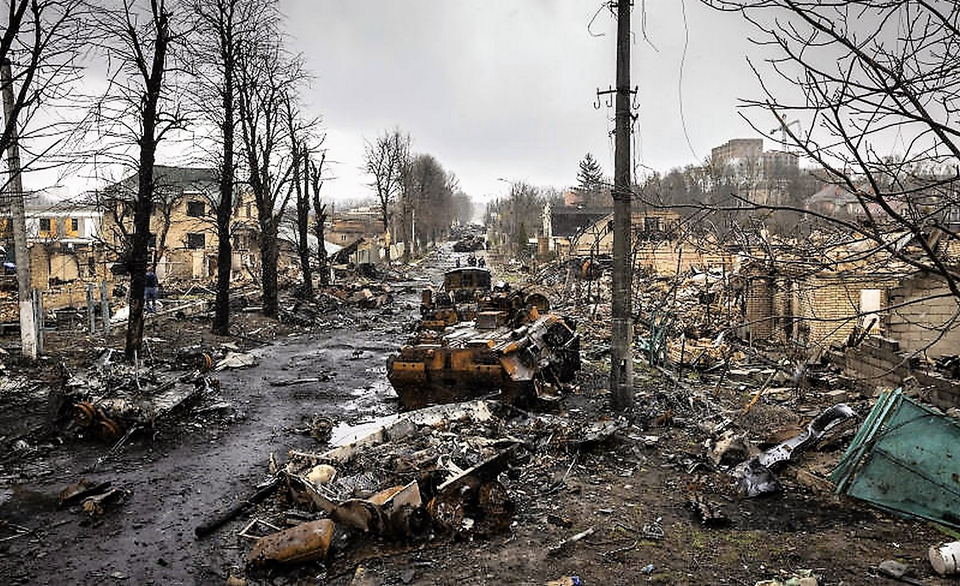
KYIV, Ukraine, April 8, 2022 (BSS/AFP) - Here are the latest developments in the war in Ukraine:
- New EU, G7 sanctions -
The European Union approves an embargo on Russian coal -- the first time the bloc has targeted the energy sector, on which they are heavily dependent -- and the closing of its ports to Russian vessels.
Earlier, leaders of the G7 biggest economies agree to ban "new investments in key sectors of the Russian economy, including the energy sector", alongside widening export bans on certain goods and tightening the screws on Russian banks and state-owned companies.
They also pledge to "elevate our campaign against the elites and their family members who support President (Vladimir) Putin in his war effort".
The US Congress also votes to end normal trade relations with Moscow and codify the ban on Russian oil.
- UN rights body suspension -
The UN General Assembly votes to suspend Russia from the UN Human Rights Council as punishment for the invasion of Ukraine.
It is only the second ever suspension of a country from the council, after Libya in 2011.
Russia rejects the suspension as "illegal", while Ukraine says it is "grateful".
- Von der Leyen in Kyiv -
European Commission President Ursula von der Leyen will travel to Kyiv on Friday to show Europe's "unwavering support" for Ukraine in its fight against Russia, she says.
- 'Last chance' to leave east -
A Ukrainian official warns residents in the east that they have a "last chance" to flee before a major Russian offensive expected in the Donbas region.
"These few days may be the last chance to leave," says Sergiy Gaiday, governor of the Lugansk region, part of the Donbas, where the city of Severodonetsk is coming under sustained artillery and rocket fire.
However, trains evacuating residents are halted by Russian strikes on the only line still under Kyiv's control.
- Borodianka 'horrific' -
The destruction left by Russian troops in the town of Borodianka outside of Kyiv is "much more horrific" than the situation uncovered in the nearby town of Bucha, Ukrainian President Volodymyr Zelensky says.
Ukraine's Prosecutor General says 26 bodies have been recovered from underneath two destroyed apartment buildings there.
- Mariupol deaths -
The "new mayor" of Mariupol, put in place by pro-Russian forces, announces that around 5,000 civilians have died in the besieged southeastern Ukrainian city.
Ukrainian authorities had put forward a "conservative" estimate of 5,000 dead, while indicating that there could be "tens of thousands of civilian casualties" in the city.
- Health services attacked -
The World Health Organization (WHO) says it has confirmed over 100 attacks on health services in Ukraine as it calls for humanitarian access to Mariupol.
"As of now, WHO has verified 103 incidents of attacks on health care, with 73 people killed and 51 injured, including health workers and patients," WHO chief Tedros Adhanom Ghebreyesus says.
- Radio intercepts -
German intelligence services have intercepted radio traffic of Russian soldiers discussing the killings of civilians in Bucha, der Spiegel reports.
The Kremlin has denied the accusations of mass killings, claiming instead that the images emerging from Bucha were "fakes" or that the deaths occurred after Russian soldiers pulled out.
- Talks 'overshadowed' -
Foreign Minister Mevlut Cavusoglu of Turkey, which is hosting negotiations between Russia and Ukraine, says the images of bodies from Bucha and other areas have "overshadowed" what had been an "emerging positive atmosphere".
- 'Significant' Russian losses -
Russian troops have suffered "significant losses" in Ukraine, Kremlin spokesman Dmitry Peskov says in an interview with Britain's Sky News, but does not specify a toll.
Russia in late March said it had lost 1,351 soldiers with another 3,825 wounded.
- Hungary 'helping' Putin -
Ukraine accuses its neighbour and Kremlin-ally Hungary of appeasing Russian aggression and "destroying unity in the EU".
Newly re-elected Hungarian Prime Minister Viktor Orban says he is prepared to pay for Russian gas in rubles, a demand of Putin's that was rejected by the West.